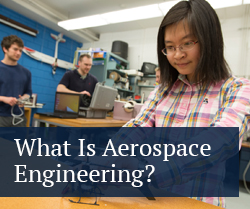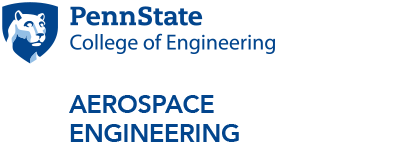Undergraduate Degree Program
Bachelor of Science (B.S.) in Aerospace Engineering
The bachelor of science degree in aerospace engineering is designed primarily for those students who are interested in the analysis, design, and operation of aircraft and space vehicles, and who are interested in becoming the next generation of innovative aerospace engineers and leaders in an ever-evolving, critical industry.
Through a combination of comprehensive coursework and extensive hands-on experience, students learn the theories and practices of the fundamental subjects of aerospace engineering:
- Aeronautics
- Astronautics and astrodynamics
- Aerodynamics and fluid dynamics
- Aerospace materials and structures
- Dynamics and control
- Aircraft stability and control and/or orbital and attitude dynamics and control
- Air-breathing and rocket propulsion
- Aircraft systems design and/or spacecraft systems design
- Autonomous vehicles
Project-based activities emphasize the development and use of teamwork and communications skills for effective problem-solving.
In the first two years of study, aerospace engineering students take many courses in common with other engineering majors, including mathematics, physics, and chemistry. Because engineering practice changes rapidly, emphasis is placed on these foundational physical and scientific principles and methods to provide students with a basic education for the engineering profession, and to form the soundest and broadest base for future work in aerospace engineering.
Depending upon the technical course selections made in the fourth year, a student may emphasize aeronautics or astronautics, and specific technical areas within these fields, including aerodynamics, structural mechanics, flight mechanics, propulsion, controls, and software.
The program is structured to ensure students develop professional excellence, innovative engineering thinking, and gain deep technical knowledge in the core disciplines and integrative systems of aerospace engineering to fully prepare them for a responsible, rewarding career that will have a positive impact on society.
Within a few years after graduation, we expect graduates of our program will be:
- Engaged in careers in the discipline of aerospace engineering, and in related disciplines where aerospace engineering knowledge and skills are beneficial, that applies the knowledge and skills for precise engineering analysis and open-ended problem solving and design.
- Pursuing continued professional development through multiple pathways including graduate programs in aerospace engineering, and in related disciplines where aerospace engineering knowledge and skills bring a useful perspective, with the skills needed for engineering research and more advanced studies.
- Acting as professionals representing aerospace engineering concerns with effective communication and teamwork skills, awareness of current issues, and ethical decision making.
Expected Student Outcomes:
The aerospace engineering program will prepare students to:
- Identify, formulate, and solve complex engineering problems by applying principles of engineering, science, and mathematics
- Apply engineering design to produce solutions that meet specified needs with consideration of public health, safety, and welfare, as well as global, cultural, social, environmental, and economic factors
- Communicate effectively with a range of audiences
- Recognize ethical and professional responsibilities in engineering situations and make informed judgments, which must consider the impact of engineering solutions in global, economic, environmental, and societal contexts
- Function effectively on a team whose members together provide leadership, create a collaborative and inclusive environment, establish goals, plan tasks, and meet objectives
- Develop and conduct appropriate experimentation, analyze and interpret data, and use engineering judgment to draw conclusions
- Acquire and apply new knowledge as needed, using appropriate learning strategies
Overall, students will gain a broad education necessary to understand the impact of aerospace engineering solutions in a global, economic, environmental, and societal context, and they will develop the required skills to implement them successfully in a professional or academic setting. A wide range of careers for aerospace engineering graduates exist in large and small aerospace firms, government agencies and laboratories, and academia.
Many U.S. states and territories require professional licensure/certification to be employed. If you plan to pursue employment in a licensed profession after completing this program, please visit the Professional Licensure/Certification Disclosures by State interactive map.
View the suggested academic plan.
Undergraduate Minor in Information Sciences and Technology for Aerospace Engineering (ISASP)
The role of software in the practice of aerospace engineering is critical and continues to grow rapidly. The effective design, development, and manufacturing of aerospace systems rely heavily on computers, software, and digital information. Some aircraft cannot fly without their onboard computers, and many future aerospace vehicles will be unmanned, resulting in even greater software challenges.
Providing undergraduate aerospace engineering students the opportunity to learn more about information sciences and technology by earning a minor in Information Sciences and Technology will not only enrich their educational achievements, but it will also make them more valuable to potential employers, and help them succeed in professional employment or graduate school. They will better appreciate the entire aerospace system and will be better equipped to work side-by-side with experts in the computing and software fields.
For more information, visit the Penn State Bulletin.
Specific questions regarding the minor may be directed to:
Amy R. Pritchett
The Pennsylvania State University
308G ECoRE Building
University Park, PA 16802
814-865-3648
apritchett@psu.edu

- Undergraduate Degree Program
- Suggested Academic Plan
- Financial Aid and Scholarships
- Honors Program
- Co-ops and Internships
- Research and Teaching Opportunities



